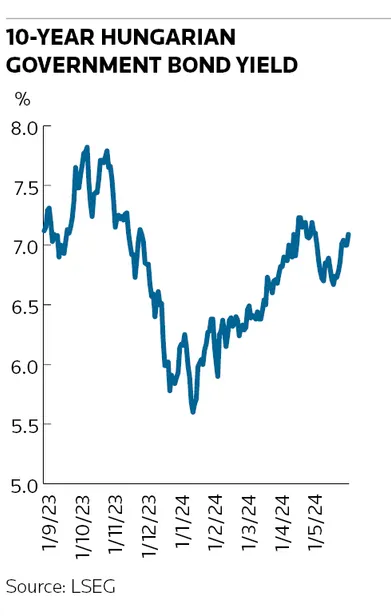Banks suffer large Hungarian bond trading losses
Banks including Barclays and Citigroup racked up large losses in Hungarian bond trading earlier this year, according to sources familiar with the matter, as several firms struggled to contend with volatile moves in those markets.
Major banks across the industry lost more than US$100m between them in Hungarian bonds in the first quarter, according to data provider Vali Analytics.
Both Barclays and Citigroup have parted ways with senior bond traders in the wake of the losses. Michael Newman, Barclays' head of CE3 rates trading (which covers Czech Republic, Hungary and Poland), left the bank in mid-April, according to the Financial Conduct Authority's register. Aditya Singhal, who headed CEEMEA rates trading at Citigroup, left the US bank earlier this year, sources said.
“Barclays Investment Bank has world-class people and robust control processes in place. As a marketmaker in emerging markets, our business naturally involves taking risks. Any losses that we might have incurred were very minor in the context of our global business and were not the result of any one individual," a Barclays spokesperson said in an emailed statement.
A Citigroup spokesperson declined to comment. Newman and Singhal did not respond to requests for comment via LinkedIn.
Hungarian markets have proven to be treacherous this year as traders have reacted to the central bank slashing interest rates from 13% in October to 7.25% in response to cooling inflation. More recently, the National Bank of Hungary has slowed the pace of its rate cuts amid signs that inflation may be stickier than previously hoped.
There has been a flurry of trading activity as volatility has risen. Nearly US$27bn of Hungarian bonds changed hands in the first four months of the year, according to market-wide data from bond trading platform MarketAxess, a rise of more than 50% from the same period in 2023. The yield on 10-year local currency Hungarian bonds climbed to a recent peak of 7.20% on April 17, according to LSEG data, from a low of 5.60% three months earlier. That move would have been painful for any traders holding Hungarian debt.
Newman left Barclays on April 18, the FCA's financial services register indicates, a little over a year since joining the UK bank from BNP Paribas. He worked at Barclays between 2013 and 2020, according to the register. Singhal joined Citi in July following a lengthy stint at JP Morgan, the register shows.
Several banks have struggled lately in their broader European rates trading businesses, where they buy and sell government bonds and related instruments on behalf of clients. Banks including BNPP and Citi suffered heavy losses in European government bond trading in late 2023 when a ferocious rally caught many traders off guard.
Barclays chief executive CS Venkatakrishnan signalled he wasn't happy with the performance of the European rates business following the bank's first-quarter results, when it reported a 21% fall in fixed-income revenues from a year earlier on the back of lower client activity in macro products. The UK bank has parted ways with some of its most senior macro traders in recent months including Carl Scott, its head of EMEA rates trading, and global head of macro Michael Lublinsky.






